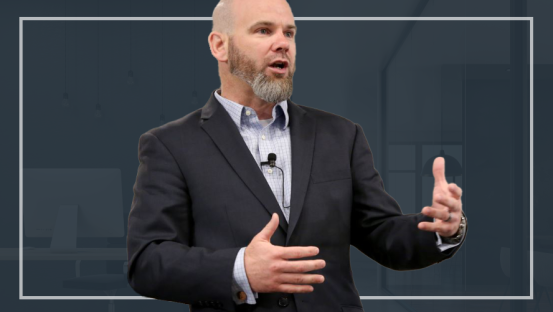World of Speakers E.43: Sally Koering Zimney | Don’t be afraid to muss it up: why your talk needs foibles and bobbles and struggles
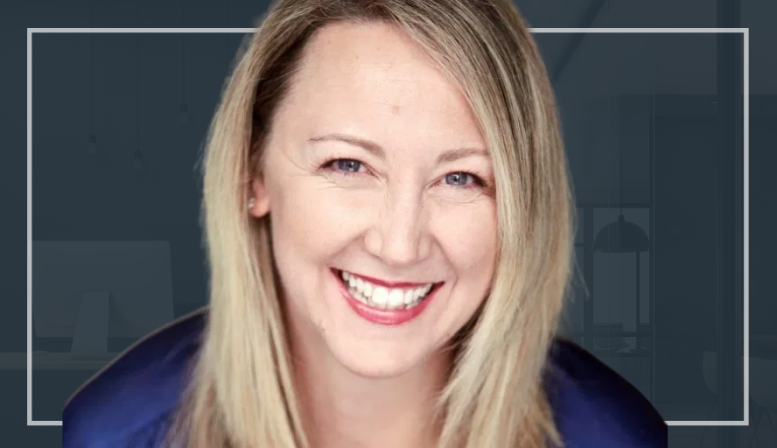
Ryan Foland speaks with Sally Zimney, a professional speaking coach, podcaster and trainer. Sally’s expertise lies in helping speakers connect on a deeper, more human level with their audience.
In this fun and fast-moving talk, Sally and Ryan explore what to do when things go wrong on stage—and how it can ultimately work to your benefit when they do.
Listen to this podcast to find out:
- The 3 things you need to do when things go wrong.
- Why being perfect and polished is actually a turn-off for audiences, and stands between you building a connection with them.
- How to tell stories that will really resonate.
- How to find the right balance of authenticity that won’t repel your audience.
- The three boxes you need to check before you can transition into paid speaking.
DOWNLOAD AND LISTEN TO THE PODCAST ON ITUNES OR SOUNDCLOUD
If you enjoy this interview we’d be honoured if you reviewed us on iTunes. Just follow this link.
Transcript
Sally Zimney: Hey everybody, this is Sally Zimney with This Moved Me.
I've just had an amazing conversation with Ryan from the World of Speakers and you've got to come and check it out because on it, in the middle of it, right as I'm talking about how you got to be imperfect up on stage, a whole bunch of imperfect things happened.
Come check it out!
Ryan Foland: Hello everybody or shall I say ahoy! It is Ryan Foland, your host, and I'm here today with Sally Zimney.
She is a presentation coach. She's a podcast host at “This Moved Me” and today she's going to move me, she's going to move you and maybe—well, I think that's it.
She’s just going to move me and you and everyone else.
Welcome to the show, Sally, how are you doing?
SZ: Thank you. I'm so excited to be on this show, Ryan. Thanks for having me.
RF: For sure.
Let's get right into it and instead of just talking about all the accolades and the cool podcasts and the amazing presentation coaching that you do, I'm going to challenge you to give me a story of your life, or from your life, from your past, that is a good representation of who you are as a person.
And then we can kind of dig into it. It could be a funny childhood story, or some discovery, or epiphany, or an inciting incident, because I think people like to connect the dots and stories always have dots to connect.
SZ: Totally.
Okay, well, there's a few bouncing around in my head right now, but I'm going to throw out the first one that jumped to mind because it's a great little insight into me, but also into a little bit about what I'm guessing we're going to be talking about today.
RF: Okay, I'll be the judge of that. I like it. This is good. I'm challenged now, okay, go for it, story time.
SZ: Okay, great.
When I was in college, I was a theater major and as we were graduating, they brought in some of these really big time directors from the Twin Cities.
I lived near Minneapolis and St.Paul and there's a really amazing thriving theater community in the Twin Cities.
As part of our graduating they brought in some of these big-time directors and I was really pumped.
I was like, "This is going to be awesome. I'm going to wow them. I'm going to really let them know they are about to meet Sally: this amazing actress".
RF: You were going to move them.
SZ: I was going to move them so much. They were going to be like, "You’re AWESOME, I want you in my next show."
RF: I've fallen out of my chair.
SZ: Right.
Exactly, I had set the expectations really high for myself, which is not a bad thing, but perhaps a little naive.
RF: Classic for graduating theater major.
SZ: Totally. Like, "I am amazing, wait till the world sees me."
RF: You were literally walking around willing suspension of disbelief in about a 3-foot radius everywhere you are.
SZ: Oh my gosh, it's so true.
I walk into the room and it's kind of your typical cattle call with auditions where there are the judges or the directors. At the time they were standing behind or sitting behind this table, ready to judge you.
You walk in and do your 90-second audition and walk out.
Very simple, it's very clear-cut.
So, I walk in, I do my monologue and I'm thinking,
"I just nailed that, that was awesome! Crushed it!"
I turned, walked out the door that is behind me in the back of the room, and when I get there, I find that the door is locked.
That was not the door I was supposed to exit out of.
I'm like, "What do I do?"
I turned around kind of sheepishly and I look at all of these directors, one of them in particular, he was like my hero and I was like, "Ha, ha, oh gosh, sorry, let me just make my way back across the room."
And I'm just kind of vamping my way back across the room in front of them, doing a little tap dance, just mortified because I had had these huge expectations, I thought it was going to totally wow them and impress them.
I felt like an idiot, it was like that moment on American Idol where they get done with their audition and then they can't find the door and you're watching this going, "What is wrong with these people, how do you not know where to exit? It's very simple."
But your adrenaline is just going so crazy and it did not click. Whatever, I made a fool of myself, and I walked out of the room and just thought, "Oh my gosh, I want to go back and erase that whole thing."
I just took myself out of the running of this, that I'm this big-time new actress on the scene.
And, of course, the conversation that I had with the directors after, who were processing us and giving us notes and feedback was a surprising one.
What one of the directors said to me, "Sally, you cannot wish that moment away, that was golden, because all that other time we are seeing this incredibly polished version of yourself, this perfected, really an overly perfect version of Sally The Actress.”
“And at that moment, when you couldn't find the door and were vamping your way across the stage, we got to see a glimpse into who you really are, which is kind of this goofy, funny person, which is very different than the monologue that we just saw. Don't wish that moment away Sally because we aren't going to forget it. It was real, and it helped us see you."
I thought, "Oh, holy cow! Okay, that was a completely different response than I was expecting”.
It has always stuck with me, partly because it was like, “Yes, own your goofiness, own kind of the messy stuff that makes you who you are.”
Also, in terms of my role as a coach, that is very central to the experience I want an audience to have. I want an audience to really see who you really are.
It's really stuck with me and then you can see, get a sense of me—under pressure I get goofy. As polished as you think you are.
RF: You just crushed that story, by the way. I mean, I love getting stories from people instead of just hearing their accolades because I feel like we have this connection, a bond, because I'm able to connect with you on a few different, humanistic levels.
Similarly, but somewhat different, I got a theater degree, but also an economics degree and I went in undeclared.
I went in undeclared and then defaulted to economics, and I got stressed out about the classes that I was going to take. I'm not good at little decisions, but like big decisions all day.
I do not want to order my lunch, I want somebody to order that for me, because I'll eat anything right? That's just me.
I'll take any class, no big deal, you have these general ones.
I go to this one general class and it was in a theater, I don't think I had been to a theater. My parents weren't theater people and I didn't even know that theater existed.
But of course, I sat next to a cute girl and then there was extra credit and then I went to this place and then it was this kind of environment with people with clipboards and these judges.
And I walked in and they gave me a piece of paper and they said, "Read this," and I read it and then they laughed, and then I went home and I cried, and I thought that I just bombed it.
SZ: Oh, no.
RF: Apparently, the scene was supposed to be funny and I didn't see the humor in it, and that's why they laughed, and I thought I did terrible, and that's what sparked me getting called back for that part.
Then I got involved with it, and then ended up acting, acting, producing, producing, directing and just fell in love with the communication that happens in real life.
You could have told me all kinds of stories, but that one I'm like, "Okay, I knew exactly where the door was and I got on my skateboard and I just went home and I shed a tear as a freshman," but I don't want to tell anybody that of course.
It's really an interesting insight because you're obviously confident and you can't be a presentation coach or a podcast host without that confidence.
You're obviously self-aware, even in retrospect, you're competitive, I'm believing you're very competitive.
SZ: I grew up with three brothers. So there is definitely a streak where you just got to hang in there.
RF: Oh, yeah. No, you don't hang in there, you beat them.
I've made up a new word, which I usually do, and it's kind of two words, I'm not sure how they're going to mesh, but it's authentignorance.
Ignorance is not a bad thing. I really feel people hear it and they're like, "It's bad."
No, ignorance is just not knowing, but at that time you were not aware of your own authenticity at that moment.
So it's like authenticity plus ignorance. Okay, we're going to have to work on that one.
SZ: What about taking authenticity and naivete? Authenticete. I like that.
RF: That's it, #authenticete and spell it how it sounds. Are you on Twitter?
SZ: Yes.
RF: Okay, what's your Twitter because I'm going to ask people to share a story on Twitter and #authenticete.
SZ: It's @thismovedme.
RF: Okay, anybody out there, Twitter challenge, @thismovedme tag @RyanFoland and use #authenticete.
We'll definitely tweet that out there to get it going and people can reply, but I think we just created a new authentic movement that people didn't even know and it'll take over, it's going to move people.
SZ: I love it.
RF: This whole goofy and funny thing, I think this is an interesting element that maybe is not always tapped into, especially in a professional speaking environment where there's this tendency to lean towards seriousness.
I think those people that are a little goofy and have that authenticete really stand out.
SZ: Yeah, I completely agree with you Ryan.
It has become a mission of mine to mess up people a little bit more, I just want to muss them up a little bit, like, "No, you've got to bust out of wanting it to be perfect" and it's amazing to me, again and again, and again.
People who come to me are like, "I want you to make this perfect. I want you to help me avoid any foibles and bobbles and struggles."
I am like, "Oh my gosh, how boring, how incredibly boring for your audience."
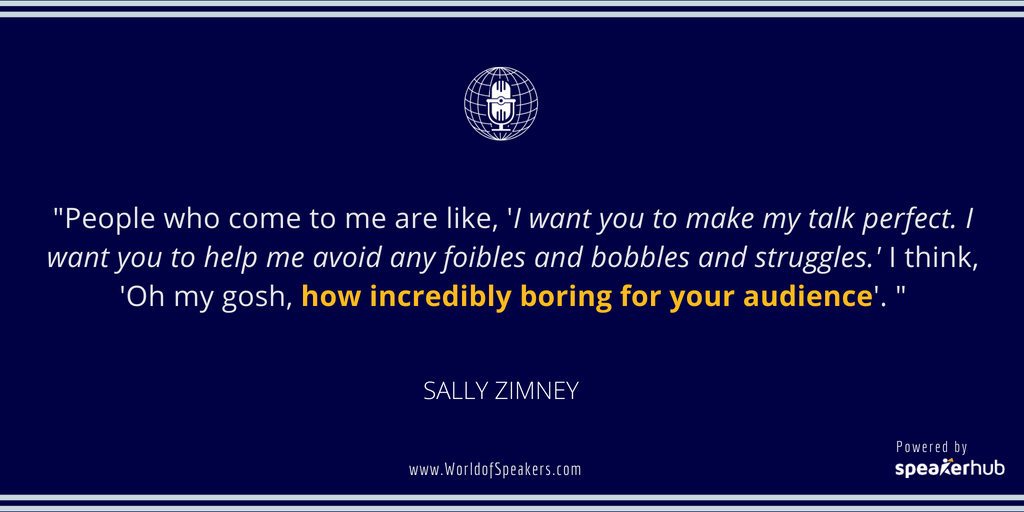
No, we're going to muss this up just enough, not that you're not going to be professional and not that you're not going to be polished to a certain degree, because you want your audience to trust you.
But once you get that point, then they want to feel like they know you and in order for us to do that, we have to be completely three-dimensional human beings.
We have to not be afraid to be a little rough around the edges, and make room for the real. Room for all those random things that happen, and not to ignore them or run away from them, but to embrace them as these golden opportunities for us as speakers to really. connect with our audiences.
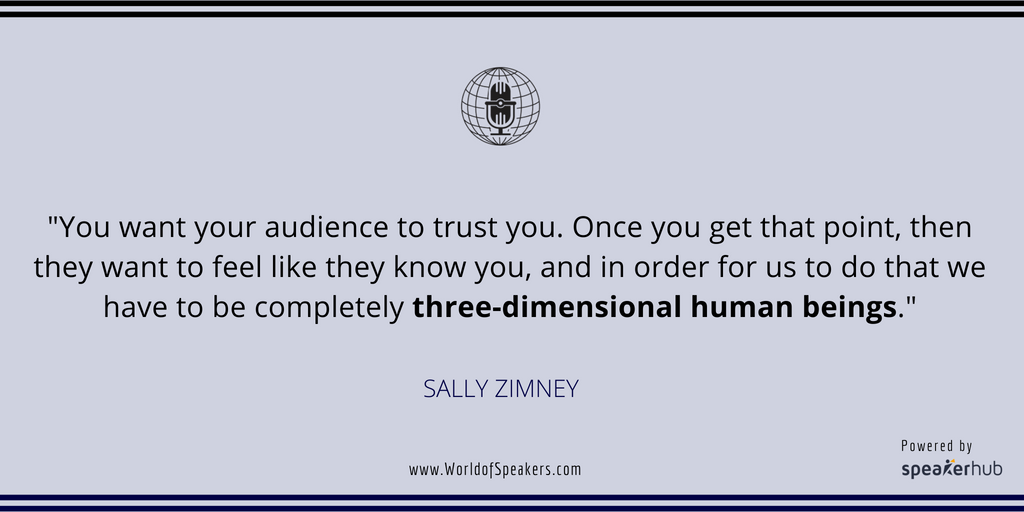
Which, in my mind, is the goal. That's the ultimate reason.
RF: Did I mishear you, did you say muss or mess?
SZ: I said both!
RF: Okay, because I have never heard muss before and I think it's an interesting spin on mess.
SZ: Yeah, mussing is like taking somebody's hair and just kind of go and muss it.
RF: I didn't know that, I muss my hairdo all the time but I didn't know it was a word. Okay, I like this.
SZ: You're mussy, Ryan.
RF: I’m mussy! It makes me think that you’re helping people to discover their mess and to discover their muss or own their muss, helps them find the wrong door.
SZ: Yeah! Go out the wrong door.
RF: Yeah, I might start a podcast, maybe we could call it "The Wrong Door" and we focus on the stories of people that went wrong that actually catapulted them to—
SZ: Yes, yes, oh my gosh! And those are the best stories, am I right?
Nobody wants to hear the story about how everything went smoothly and how awesome you are. No, thank you.
RF: It's going to be like the evil twin brother of This Moved Me. It's like—The Wrong Door.
SZ: I love it, that's great.
RF: I've got three questions based on this crazy methodology that I speak on called the 3-1-3 method.
I help people take their muss of communicating what they do and lock it into three sentences, one sentence, and three words.
After I got to know you a little bit, which I just have, we're kindred spirit muss-souls, the three questions that give our listeners just a real quick high-level view of what you do and then we can move into some of your tips and tricks and then some of your experiences and monetizing and expanding the message that somebody has.
The first question is, what is the problem that you solve?
You're not allowed to tell me what you do.
I mean secretly, we know that you're a presentation coach and a podcast host: but what is the problem that you solve without telling me what you do?
If you start to tell me what you do, I'm going to go “Buzz!’ and then it's like a game show.
The big, big, big deal is you have to fit it into one sentence.
SZ: Okay, I'm going to try.
RF: All right, what is the problem that you solve? Okay, and if you hear a “Buzz!”, then you just know we'll start over.
SZ: Okay.
RF: All right, ready, go.
SZ: Boring presentations.
RF: Okay, that was only in two words.
SZ: It's not a sentence.
RF: Okay, so the problem is boring presentations. But that doesn't sound like a big problem.
What is the result? What is the real pain?
SZ: Great question! Yes, you're right, dig deeper Sally, dig deeper!
RF: Yes, dig deeper in one sentence.
SZ: Okay, so I'm going to have to talk my way into this just a little bit.
RF: Sure, that's fine, and then we'll wrap it up.
Here's the idea, don't take this the wrong way—but I believe nobody cares what you do.
SZ: Totally.
RF: I don't think people care what I do. I don't think people care what any speaker is speaking about.
They only care about the problem that a speaker is solving for them.
It's a very selfish world, there's nothing wrong with that.
We don't have enough time to pay attention to everything, so we pay attention to the stuff that solves the problems that we have.
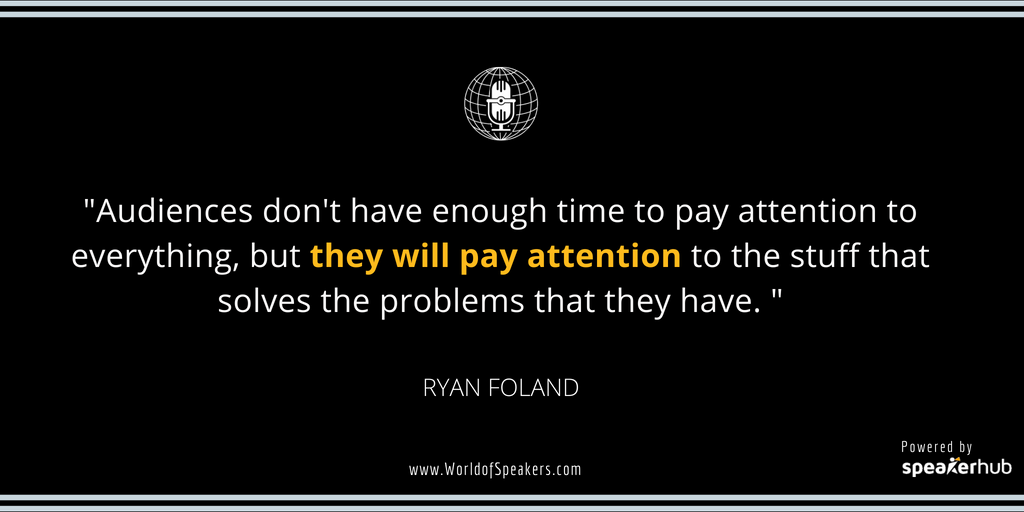
If we can clearly identify the problem that you solve, and in a way that makes people feel like it's a real bloody problem, there's an inclination for them to want to know how you solve it, and then that's where we move forward.
SZ: This is excellent, Ryan, and I totally love you're challenging me on this, because I help people clarify this for them, but clarifying it for yourself is so much harder.
This is great.
RF: I know, have you heard about the cobbler with no shoes?
SZ: Yes.
RF: Have you heard of that, really? It's very simple.
SZ: I think I have heard this, but yes, tell me.
RF: Basically the cobbler is the person that makes you shoes, but there's this old fable about the cobbler who is so busy making shoes for everyone else that he doesn't have shoes.
It's like we are all cobblers in our own right where we're producing all these things for people, but then it's still hard to make our own shoes, because you're so focused on everybody else.
SZ: Yes, speak it Ryan. That's exactly it.
RF: Don't talk about the shoes that you're making, talk about the sore feet that people have.
What is the problem that you're solving?
SZ: The problem that I am solving is that the world needs more humanity and I think talks are the platform through which we can bring more humanity alive.
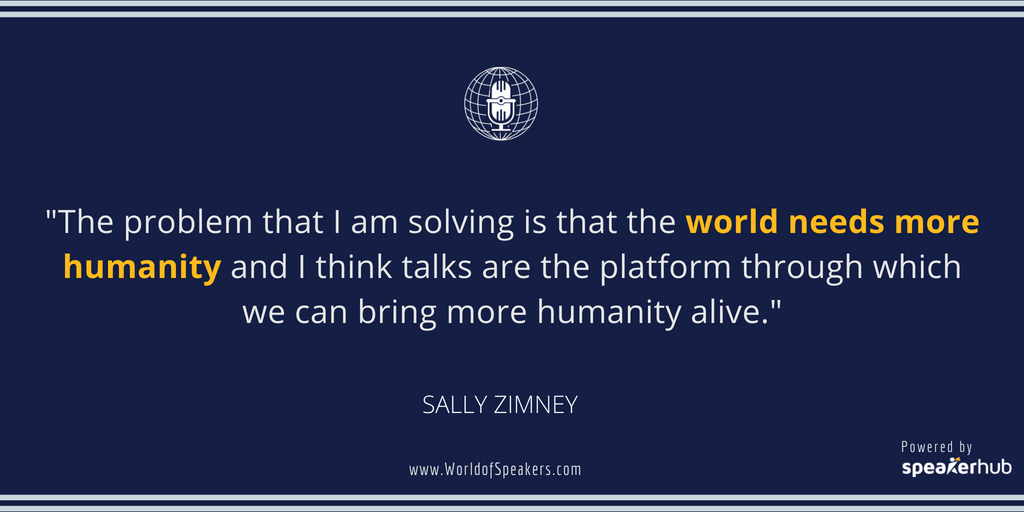
RF: So the problem is that in this day and age, there's not enough humanity?
SZ: There's not enough humanity.
RF: That's different than the original problem.
SZ: Totally different.
RF: Okay, well we can reverse engineer, but like if someone is more human on stage and they muss things up, does that make for a less boring speech?
Okay, so I see where you're going a little bit low here. The problem is that speeches put people to sleep and—
SZ: Our ideas die on the vine.
RF: Okay, yes, our ideas die on the vine when they're presented in a way that makes people go to sleep.
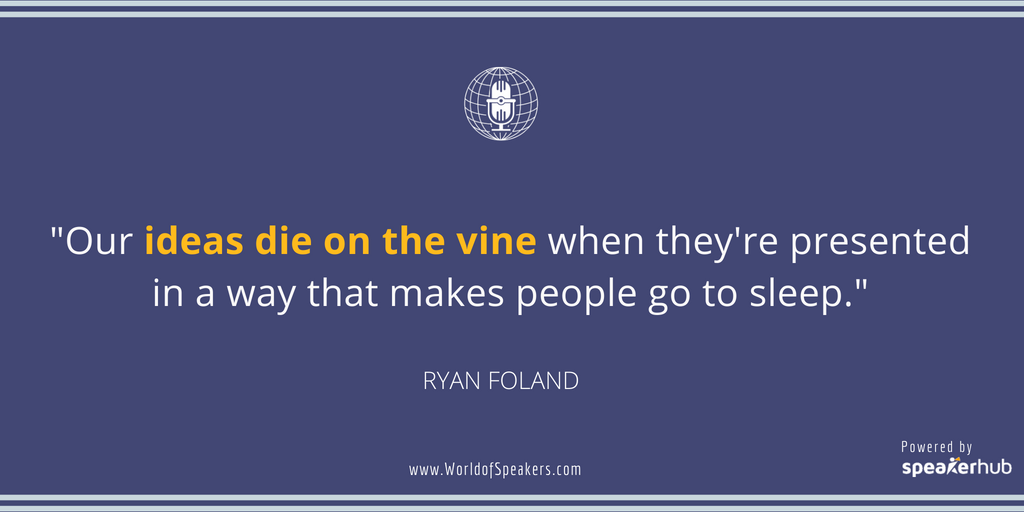
SZ: Yes.
RF: All right. I dig that. That's a good problem.
We can spend an entire hour on that, but I'm cool with that.
SZ: That was helpful, Ryan, thank you.
RF: Good. Well, you love the 3-1-3, it's powerful, that's what I do, that's the problem that I saw. But we're talking about you right now.
Now, tell me what your solution is, but don't tell me how, just tell me what.
You can't tell me how. In one sentence, what do you do?
SZ: I inspire people to become unspeakers.
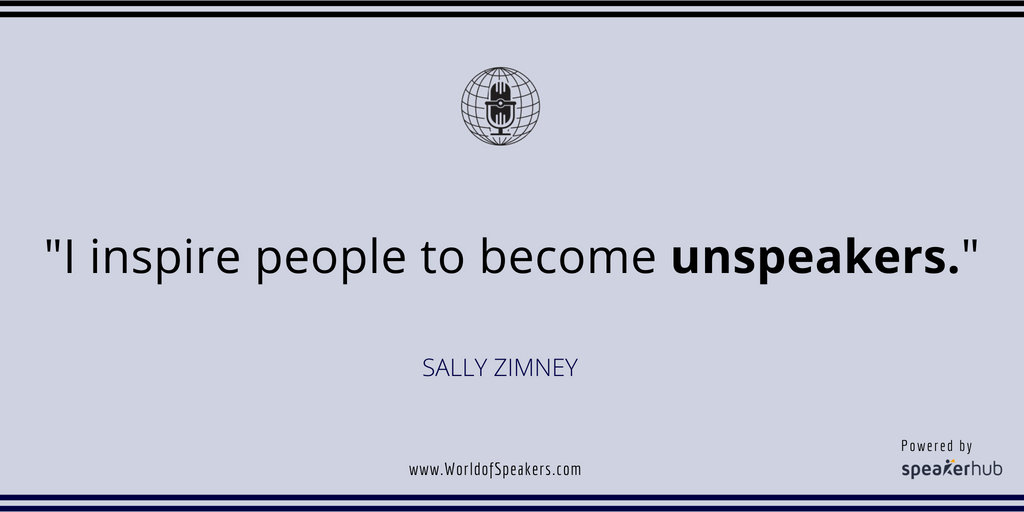
RF: Oh, okay, that's cool. Then my next question would be who is this for?
What is your market and tell me what is the market in one sentence.
SZ: My market are purpose-driven thought leaders who want to change the world with their talks.
RF: Okay, cool. Now I'm all interested.
I know the problem you solve, I know a little bit about what you do, I know who you serve and that makes me want to know how does this work?
I think everybody is nice and caught up now within these three sentences.
SZ: Oh my gosh, I'm sweating over here, that was hard! Woo!
RF: Okay, good.
Well, now I get to make you sweat more, okay, with giving us some really handy tips and tricks about what you would suggest people do in their talks to solve that problem.
What are some of the strategies? What are some of the the things that you work with with your clients to muss them up a little bit, to help them find the wrong door on stage?
Are you the type of person that gets somebody to trip on their way up to stage so that they get that initial mussy connection with people? Is that you?
SZ: No, that would be such an unfair thing to do, like really, really mess with people's minds.
Ultimately, I'm kind of joking about that, but the biggest transformation that I make with people is what is happening in their heads.
A lot of people come to me with some level of speaking experience.
I'm always doing some work on the skill, the delivery skill and how they're using the stage and how they use their body.
I spend a lot of time helping people clarify their content and making it really meaty and personal and to use an overused term, authentic, but really helping people get clarity on that stuff.
The biggest shift, and we cannot really become unspeakers unless we can change our minds about what speaking is, and that is a big piece of what I do.
Because people come to me, even experienced professional speakers with something on their mind that has to do with, "My credibility is built on how perfectly I do this".
I really want to take that mindset and kick it out the door because it does not help us connect with our audience.
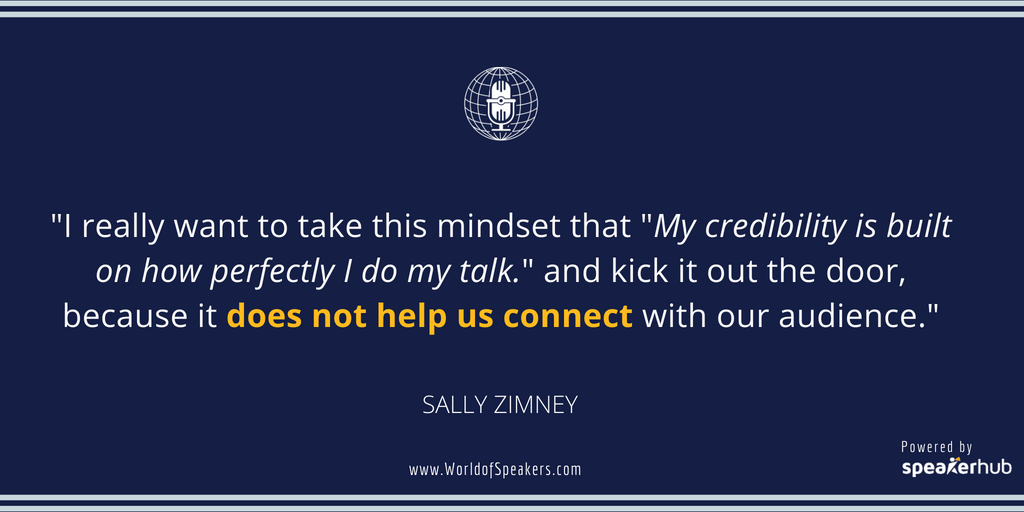
One of the biggest things I do at the beginning, is a lot of conversation about the things that hold us back from really showing up fully to that moment on stage. What is keeping us back.
RF: Give me an example of maybe one or two things that someone can do?
Within that conversation, what are some of the key takeaways where a listener would be like, "Okay, I haven't worked with Sally yet, but wow, that one piece is going to change it."
How do you get people to muss it up? What does that conversation look like?
SZ: Well, it's a personal conversation. I mean, this is not something where I can offer you a bunch of questions.
[drilling sound] What's this? Oh my God.
Hey, this is a perfect example!
Going out the wrong door.
RF: This is where your authenticete will shine.
Actually, this is funny. People were listening, they're like, "Wait a minute, this is the stuff they should have cut out."
But I'm going to be like, this is on point!
The door has been shut and you're trying to leave, you're trying to leave the house right now.
SZ: Let me out of the house!
RF: It's time to get goofy and just channel it. This is an acting exercise, we're just going to roll with it and whenever you hear or feel the drilling sound, if you want to incorporate it, that's fine.
You want to make an exercise about it? That's fine.
But let's make the show go, this is as on point and as authenticete as it gets.
We don't have control over external forces most of the time, and I'm assuming that's one of these things that you're talking about with people, because an audience is an external component, right? Somebody coughs, somebody sneezes.
SZ: Absolutely.
RF: Somebody brings a power drill and decides to do some maintenance work during your talk.
Really, let's get back to it and let's skip to the tactics of what you coach people on when things go wrong on stage?
SZ: Yes, okay.
The biggest thing that you can do when it happens, and I alluded to this earlier, is to not run away, like plant your feet and stay there, stay in the moment. Because what we want to do—
RF: You want to run!
SZ: Oh my God, I'd be like, "Let me out of here, can we do this another time, can we find another way to do this?" I'm just speaking what is in my heart right now!
So stay put, plant your feet, and then find the lightness in it.
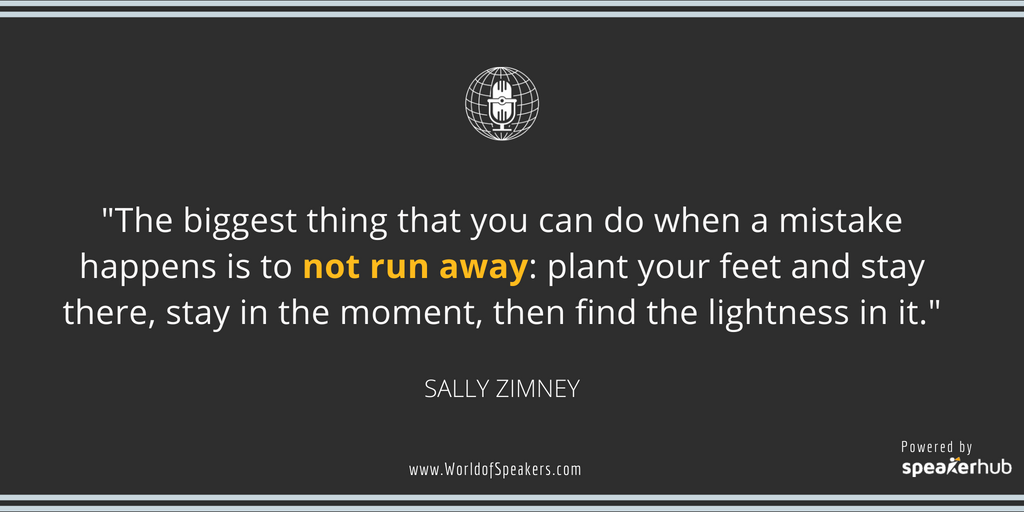
Once you have just accepted that this is happening, then your job is to find the lightness in it.
Because as an audience member, if you suddenly feel awkward about what is happening, it just absolutely can turn your audience against you, because not like, "Screw you, we're mad at you," but they start feeling really bad for you and going, "Oh my god, this is terrible!" because they're empathizing, right?
They are starting to feel your pain for you.
If you can really acknowledge the awkwardness or the embarrassment, or anything like that, then they go, "I have been there" and it opens up this warmth and connection to the audience that you honestly might not have had without it.
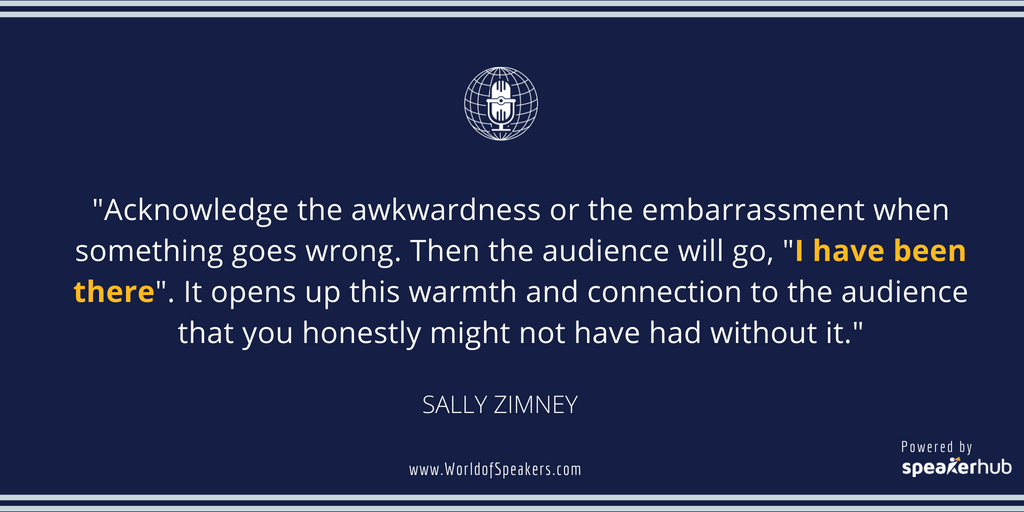
And so, as I'm sitting here and somebody's working in my basement 30 minutes earlier than they're supposed to be, I just have to own it and I can't run away from it, and hope that the audience can stick with me on this.
RF: Right, but you tried and actually your true personality came out at that moment when we thought that you were going to be offline.
So rolling with the punches, that's one of your main strengths, is you take somebody who may be super polished, and you unpolish them, or you muss them up.
SZ: Yes, and just help them see that the strength of their connection to the audience comes from their humanity.
It comes from that messiness and that sometimes in our effort to be our most credible and to be our most polished, we actually build a wall between us and our audience.
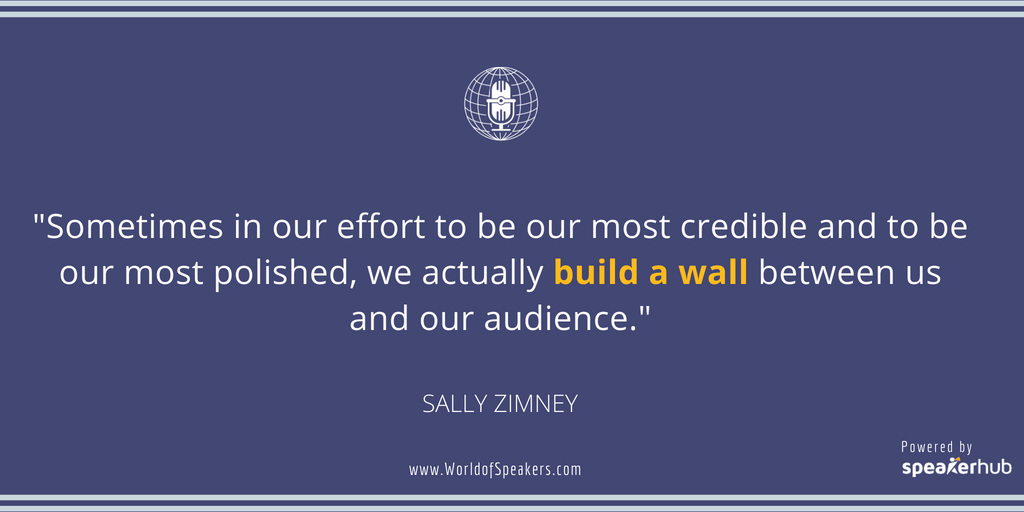
RF: So here's a question: from stories that are told on stage, do you also encourage people to find stories that went wrong?
Is your presentation coaching helping people to find vulnerable moments, knowing that it’s not all the time that somebody's going to exit the wrong door on stage, or do construction work when they shouldn't?
Are you prepping them? Do you encourage people to dig deep and expose some of these more humanistic traits versus all of the accolades and “this is why I'm so special”?
SZ: Oh! Absolutely.
I mean, a speaker who stands up and just tells me how right they got it, and how much they know, actually I end up feeling like,
"Wow, clearly I have nothing in common with this person. They have it all figured out, good for them."
That doesn't help me at all, because I don't feel connected to you.
And so when we can share the stories about how we learned what we know, the journey that got us there, and the stumbles along the way, then those are the moments where I feel like, "Maybe I can do that too. Maybe I can make that same journey."
Because if you just show me everything that you gained from that, then I don't know how you got there and I don't believe that I myself can get there too.
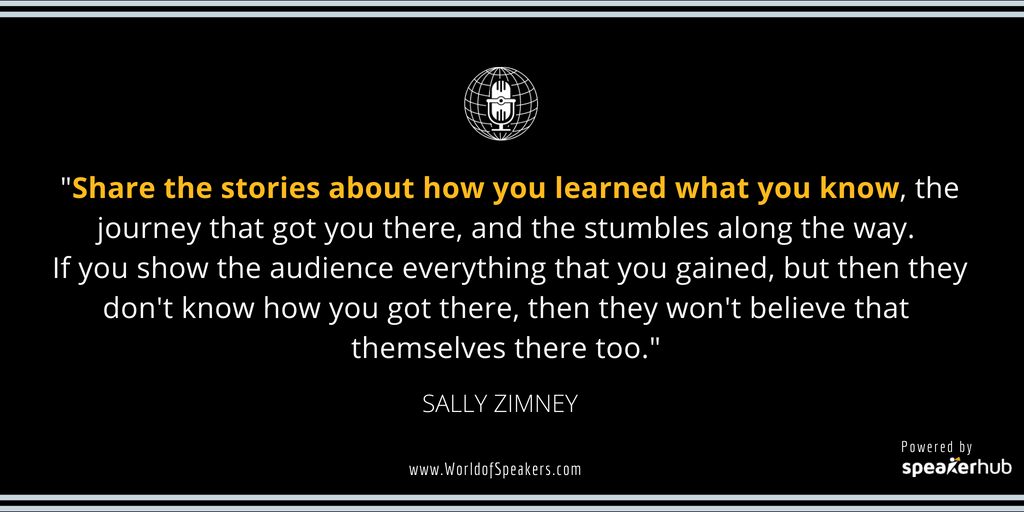
RF: Do you know what is the best way to securely drill something is? You put a guide hole first, right?
So, the guy who's working downstairs is probably drilling a little hole and then putting in a bigger screw behind it.
What you're doing is you're helping people find what is the little hole, what is the thing that happened first that allowed you as this bigger screw to come in there and actually gain that traction?
Because if you just come in with that big screw you're going to split the wood apart and it's not going to be as sturdy, or lined up.
SZ: You're a metaphor guy, aren't you, Ryan?
RF: I am.
SZ: You can tell, it's awesome.
[drilling sound] That was a big one, sorry, my stomach is growling!
RF: Well, I also have an appetite to continue to get some of these insights here, right?
SZ: Okay, so let me share something with you really quickly because I just recently was helping somebody—
[drilling sound]
You stick with me, is this unbearable?
RF: I am here. I don't feel bad for you at all.
Of all the podcasts, I'm going to remember this one probably the most.
SZ: [laughs] Wow, mission accomplished.
I was just helping somebody recently develop their TEDx talk and it was the second TEDx talk that they were doing and he came to me because he wasn't very happy with his first one.
He just felt like he didn't quite connect the way he wanted to, and he sort of knew in his core that he wasn't bringing enough of himself in that moment.
The big fear that he was getting over was this fear that he was making it all about him and that he was this person, he was like, "I know everything, you guys know nothing," and he didn't like how that felt.
That was not in line with who he is.
RF: He didn't feel like he was serving the audience as much as building himself.
SZ: Totally.
RF: There's a fine balance too, because when it's your story, it's hard to not focus on that, right?
SZ: Totally.
There's a really important balance there that if your story does not serve the audience then it really ultimately is about you, and people...they don't care ultimately.
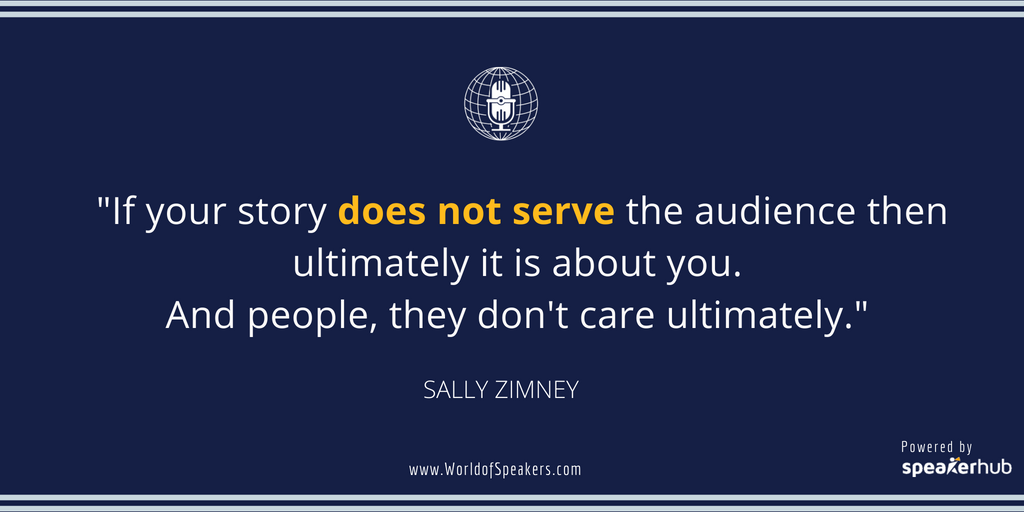
RF: They don't care what you do, they only care about the problem that you solve.
SZ: Right, and they want to know how they're going to benefit from it because they want to see themselves in us, even if we're completely different people.
Our job as speakers is to pull out the universal piece in there, that we can all connect with.
I really had to work with him about the fear that was holding him back from just really sharing something about himself.
He was like, "Well, you know, it's not about me, I don't want it to be about me. I want it to be about these people that I interview."
I was like, "Yes, but I don't care about these people, until I feel like I know who you are and how you are bringing your insights and your expertise."
We are meaning-makers as speakers.
We get to create the meaning from the story and hold it out to the audience and ask them to come and take part in it and to dig into themselves.
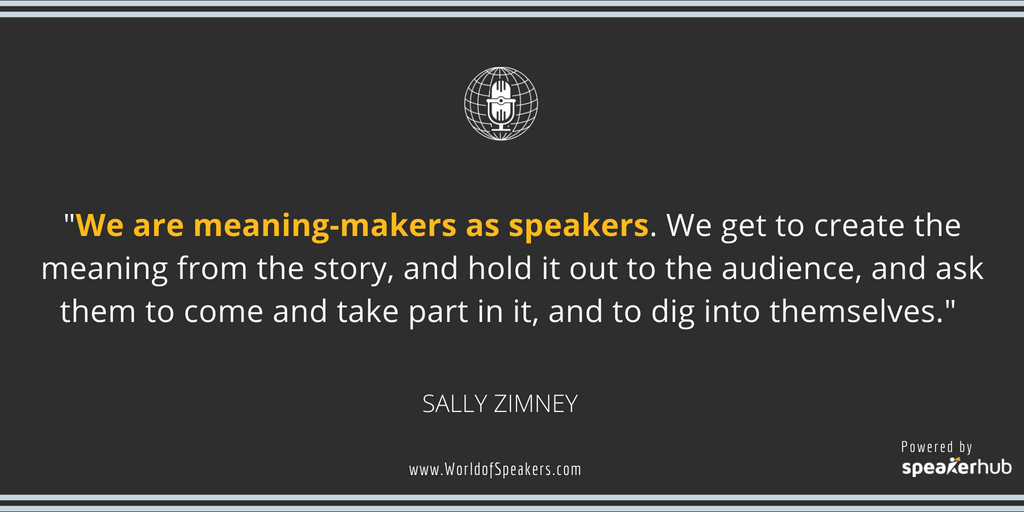
RF: To actually measure things out and then, measure twice, cut once, instead of it just being somebody who's like, say, in your basement just aimlessly drilling in things.
If you think about it, the analogy of a drill and drilling things with your audience is an exact sort of replica of what he was fearing, which is you don't want to drill your message into somebody, you want them to feel like they're part of the project, they're part of the framing, they're part of this house that you're building, right?
SZ: Yeah, and you don't want to feel like I feel right now, which is I wish they would have told me they were coming 30 minutes earlier because I wouldn't have scheduled this right now, but here they are.
RF: This is so serendipitously beautiful, this is great.
SZ: I'm so glad you feel that way.
RF: So how did you get him to take the drill out of his hand and give it to the audience?
SZ: Well, we did some storytelling exercises together, where when we first sat down I said, kind of dug into him, sort of like how you did with me with the 3-1-3, like,
"What's behind that and what's behind that. What's the story there?"
You're telling a story that needs to be told when you are afraid and you're not sure if this is the one you should tell. That's the one you should tell.
If you're like, "Oh, this would be a great one. This makes me look really good," or, "I've told this a million times. I can tell this one."
No, the audience wants to have a sense that you are risking a little bit, because again, the edges of those stories are the places where all the humanity exists.
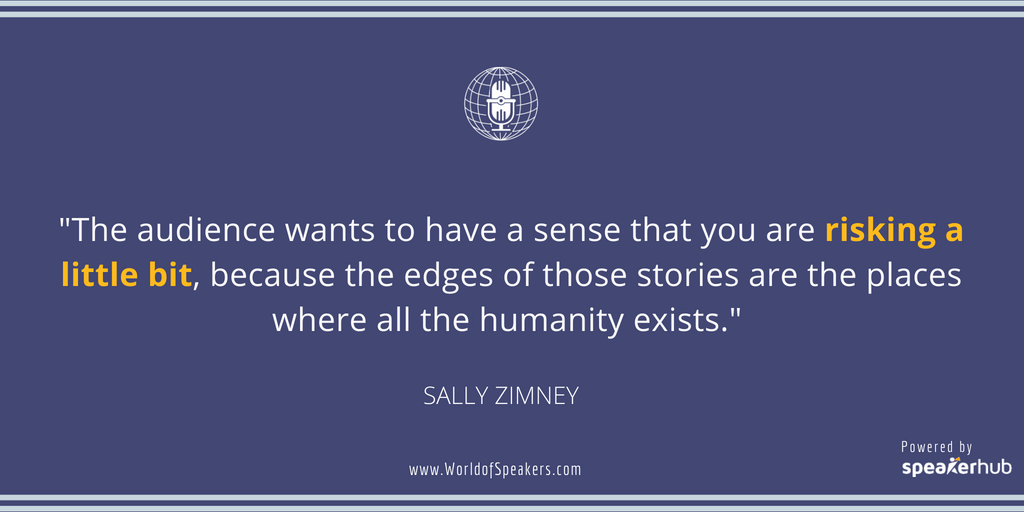
That's where an audience is going to see themselves or recognize the challenge or recognize the hurdle that you've overcome and recognize all of the juicy stuff that makes us so messy as human beings. Those are the connection points.
Helping him identify what that story was, and honestly, it didn't take long, because he came to me knowing that he needed to go somewhere he hadn't gone before.
That he had to push himself.
RF: It makes me think of—and I'm just making this up, but it makes me think of a mother-in-law test.
If you have say a girlfriend or somebody like that, or a boyfriend, and you're meeting their parents for the first time, there's a lot of heightened pressure, and you know that you're trying to communicate who you are as a person, and it's like the stuff that maybe you don't want to tell them like, the Mother-in-law test: “I'm not sure if I really want to let them know about this at this point,"
It almost makes me feel like that's when you know you're onto something right and that's what actually builds that relationship.
SZ: And of course, there are probably some things that your mother-in-law does not need to know, because you're building trust.
But there is a moment in a talk and there's a moment in any relationship, and that's what it is between speaker and the audience, it's this relationship where you have to really show up, and you've got to bring the wall down that exists between the audience and the speaker and they want to be able to recognize.
We, as human beings, we recognize, we get it, we see it.
Just like when you ask somebody, "What did you appreciate about the presentation."
So many times it's, "It was authentic."
"Okay, well, what made it authentic? What was that?"
It's very hard for people to describe it.
They can pinpoint it. And essentially it's, “I feel like I know that person.”
RF: It's that human element that is the problem when somebody says, "What was great about this presentation?"
"I just don't know, I didn't like it."
That's the problem. It’s that people don't feel that humanistic connection.
SZ: Yeah. It's like, "You didn't make me care" right?
There's nothing in it that emotionally connected with me.
People can take this idea of authenticity too far, and we've all seen that before too, like, "Okay, I just need to be really transparent. I just need to share it all."
That's not it either, because there is a point at which an audience goes, "Too much! Too much!" it's like, "We're not there yet, you are totally misreading our relationship right now".
RF: Right.
SZ: But we like you showing up to the potential mother-in-law and sharing how you're still hung over from the night before, or something...I don't know.
RF: No, that's a good example.
SZ: I don't know you, Ryan [laughs]
RF: I dig this.
How does this idea of I'm going to say more of the “humanistic tone” and stay away from the authenticity because I think that is buzz, although authenticete is definitely fresh.
Tapping into your authenticete is where it's at.
How important is that for monetizing your message and for taking your speaking to the next level?
Because I can hear some people listening to this, thinking,
"Yeah, well, I understand that and yes, I want to make a connection but at a certain point if I'm going to get paid to speak, I've got to be professional. To get a $10,000 to $40,000 keynote, I can't be telling them secrets or whatnot."
So tell me the bridge, because I can see from a lower level or a middle speaker of free engagements and just getting exposure, that's a really great tool to get comfortable in connection.
How do you help people make that transition?
I know that the humanistic part doesn't go away, that's a challenging step to understand.
SZ: Yeah, and I think that's a misnomer to believe that at some point, you become polished and professional.
Because I think being our human selves doesn't make you less professional or less polished, that is a mindset that is getting in the way of us really delivering talks that will move the world and will change our audiences.
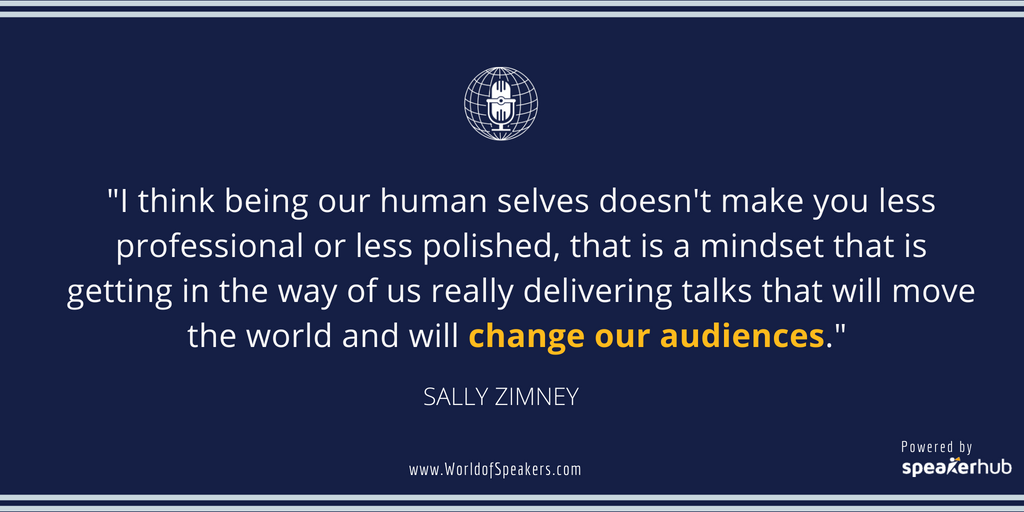
It won't happen without it, without us showing up as fully ourselves. It doesn't mean that you don't give a crap about what you're doing, you don’t just show up and wing it.
It is the exact opposite of that.
It's, you've prepared enough that you can show up and let go a little bit, you can show up and be open to what the moment holds.
Here's the connection that I see between authenticete and your speaking business.
And that is, that we have to know ourselves really, really well.
You have got to really understand and have a really clear idea of who you are and what you have to offer the world, because in those moments, in those authenticete moments, it is an incredibly vulnerable, real thing like what's running through my head as the clothes come off—it's a naked moment.
RF: Somebody shuts the door and your dress gets caught in it, and then they just drive off and you're all of a sudden—
SZ: Woo! And so, knowing yourself, that is the people who know themselves well, in those moments, they're making bank. Okay, so I don't want to—
RF: I like this, you’re debunking the myth, like you don't have to be an A student to make a $10,000 to $40,000 keynote.
You have to have a message that resonates, that's going to transform people in 45 minutes enough so that it creates bottom-line change for a company that's got a budget of that to pay you.
SZ: Yes. Now, part of this is you do have to play the game a little bit, right? Because you’re just, in some way, getting in the entrance, unless you've got this reputation that completely precedes you.
For most of us, we have to know how the game is played and play that enough. You've got to have all of the boxes checked right, in order to get in the door.
RF: Tell me, because there's a lot of boxes checked...If you were going to make sure that you checked three boxes to play the game, what are those three top boxes to check?
SZ: That you have a very clear, clarified message.
RF: I like how you use clear and clarified in the same sentence, that's clear clarify.
SZ: Very, very clear. Double clear.
RF: Oh, just call double-clear. #DoubleClear.
SZ: This is great, I'm really showing up as myself right now, Ryan. That's good.
RF: And we are together in a construction unit, building this thing one screw at a time, so it's totally fine.
SZ: You could just improvise! Do you do this with all your speakers, where something happens and you riff on it metaphorically the whole time?
RF: This is very much me.
I'm in the moment when I'm on the radio, I have a live radio show as well and I deal with people at the moment and I'm definitely, I get excited about being on my toes, not like a ballerina style, but just like martial arts style, like always enough weight 30% here 33% here so I can move frontwards, backwards.
I just tend to think in analogies because it helps to say a lot more in a smaller amount of time and then whoever has experienced martial arts, they'll take it further in meaning and run with it, and so I feel like less becomes more.
SZ: Yeah, I mean, metaphors are so incredibly powerful. And they have emotive meat built into them, which I think is great.
RF: Emotive meat.
This is full of great vocabulary, emotive meat.
Also, I'm going to bring it back, since we're talking about cool vocab here, you talked about “vamping” your way across.
“Muss” was interesting as well.
And then, I think you even said foibles. What the heck is that?
SZ: A foible? A foible is like a silly mistake.
RF: You are full of these, this is great.
SZ: Like saying clear and clarified together. Double clear. That's a foible. You know?
RF: Now I know, this is great.
SZ: Some people would be like, "Oh my God, I totally screwed that up. I'm an idiot. I said clear and clarified." Well, that didn't run through my mind.
RF: You owned it. You came up with a new turn.
SZ: Double clear. You've got to be double clear.
RF: Okay, so back to the checkboxes, we get double checks in all the boxes.
One is to be double crystal very clear on your clarity.
SZ: Yes, and then the other piece is, I'm going to say, knowing your audience. Which I know is sort of the basic box to check, but I think we need to be doing a little bit more on that front as speakers.
Especially if you have the goal of being a professional speaker or move in that direction. In order to really make space for the audience in the room, you need to make some time and effort in space to know a little bit about the people you're talking to.
And this is a challenge that I have, especially with professional speakers who literally show up, hop on stage, and walk back out again.
I think we need to be doing more for the audience and with the audience, in order for this to be an exchange that does move them, and that does serve them in a way that makes sense.
RF: Gotcha.
So not only knowing your audience but actually like, KNOWING your audience.
It's the same word with a different tonal inflection, so we get some subtext in there.
If we could give 7 actors the word “knowing” and encourage them to really get the deep passionate meaning within that one word, we've got to really know.
SZ: I'm afraid that the way people might interpret that, Ryan, is some sort of innuendo and that's not what I'm going for!
RF: Okay, I can see how the tonality would do that.
You've got to do more research than you think you need to know, so that when you get on stage you feel like you're with your family and friends where you know more about them than strangers.
SZ: Right.
This is not a new idea, but I'm going to reiterate it because I'm always surprised again and again at how many speakers don't do this.
I talk about breaking down the wall between you and your audience and what that means. That fourth wall. It's a theater term.
RF: I know that, yes, it's amazing.
SZ: Right, I am sure you do.
Our goal as speakers is to break down that fourth wall.
Well, quite literally too many of us don’t use the time before the talk has started. We don't ever go into the audience, right?
If you're in the same room with them, not if you're being introduced on stage, obviously that doesn't work, but if you are in the room with them as they're coming into the room, and instead of standing up at the table, you get to go down and be with the people, talk to them, connect with them.
"How is your day going?”
”Who are you?”
”What are you all about?”
”Where were you right before this?"
Just so you can get a little bit of a feel, and they start to see you as a human being and not this far off person, this far off expert.
We think there's power in being the far-off expert and what I really want to do is flip that on its head and say the power is in coming closer.
The power is getting in with the people and being with them, with the people.
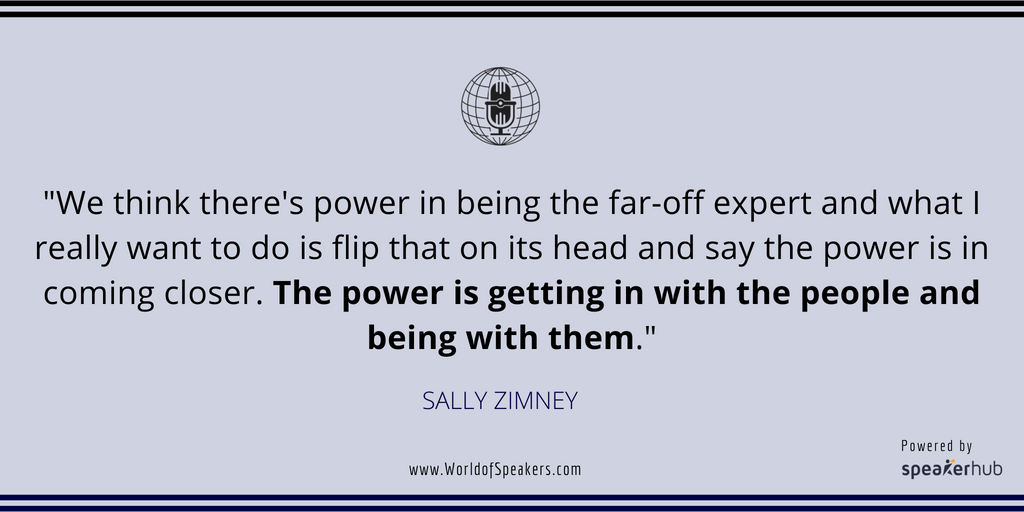
RF: Power with the people, I like it. Alright, what's the third and final checkbox? Well, not final, the third place. There's a lot more than three checkboxes.
SZ: There's a ton more.
In terms of the materials that you provide to people, and I'm not an expert on this, I just need to be really clear about this.
My expertise is in the content development and the delivery of people's talks.
That is absolutely why I'm put on this earth and coaching people towards a more authentic experience as a speaker and for an audience.
I've helped people in this process in the business world and watched them as they've developed their speaking businesses.
What I tell you is the people who have really excellent—
RF: Traction or success or they actually get paid and they continue to get booked, that kind of people.
SZ: Right, those people are bringing their materials to the world, so they're one-pager and they're real and they have videos and they're doing it in a way that has a lot more personality.
And so they're not afraid to break the mold, and break some of those rules, about what it means to be a speaker.
They're standing out in a way.
Essentially what I'm saying is these are all checkboxes that we can check, but also do it in our own way.
I just want to encourage everybody to do that, because there's so much more creativity and possibility and I think people want to know that you understand the expectations of the speaking world, but you don't feel constrained by them.
RF: So, forget the blue or black ink get some scissors, get some tape, get somewhat—
SZ: Smelly markers.
RF: Smelly markers, get some pipe cleaners from zip-ties.
I'm the kind of guy you give me a checkbox and now that we're thinking about it like this, I'll poke a hole through it with my pen, I'll take a zip tie and tie it around there.
That's my check in the box. In fact, I might add a zip-tie to my one-pager, maybe with some duct tape, too.
SZ: Yes, duct tape it!
RF: And they would be like, "What's up with this?"
And I am like, "You never know when you need a zip tie or duct tape and that's pretty much what I am. I'm the duct tape that you need to solve the problem that your company has."
SZ: Because then people understand, "Okay, he knows he needs a one-pager. But wow, I feel like I'm getting a sense of who he is just based on this one-pager."
RF: Yes, whether or not I'm walking through the right or wrong door.
I love it. We're going to keep moving forward.
That's the goal.
Hey, so as we're closing this down, I want to give you a chance to pitch your podcast and maybe we can move some of our listeners over there as well.
Tell us real quick about the problem that's being solved by “This Moved Me”.
What is the base behind it?
SZ: This Moved Me is a podcast that is about the art of public speaking.
I have conversations with speakers much like you do, Ryan, about the art of their development and delivery of their talk. We talk about all kinds of different things.
It has been such an incredibly fulfilling surprising thing that I've done and I don't know if you feel this way Ryan, but I love these conversations.
RF: Oh, you can't tell that I hate this. I mean no! I am enjoying every minute.
SZ: It's so amazing and I had the chance to talk with some really incredible people from all over the world and I love that, and then I also offer my own tips and tricks and insights about how to develop and deliver more moving presentations as well.
That's over on This Moved Me.
I’m just launching some online courses in the next few months, I'm so excited.
Building a new platform called “Moves You” where we'll be doing some mini-courses that people can check out online about really clarifying and developing powerful authentic, audience-centered content that will move their audiences.
RF: Mic drop!
Alright, so you got courses, you got podcasts, you got information, and hopefully whoever builds whatever downstairs it ended up being awesome.
I'm glad we did not disturb them, and I'm glad that it was an actual representation of a shut door and it really, I think, got your goofy side out, which is the first thing we started with and in order to resonate with an audience you've got to tap into your goofiness and your authenticete.
SZ: Oh my gosh, I feel like you've brought out some good stuff Ryan. I'm really excited.
RF: Hey, well we built together, we used our words as drills and our listeners as wood.
Hey everybody, check out Sally and check out the This Moved Me podcast and this was fun.
And if you want to share this podcast with somebody saying, "Hey, literally, they had somebody doing construction underneath and they tied it into it"
we'd be happy for you to share it because, who knows, this might be the best podcast ever because we just rolled with the drills or punches.
SZ: There we go. This was so much fun, Ryan, thank you.
RF: Totally fine.
Alright, Sally, we will connect, and hopefully, maybe, we'll share the stage sometime or something like that. We'll figure it out.
Alright everybody, Sally, and her last name is Zimney and we'll talk to you later.
Anybody and everybody, if you want to find more of these amazing podcasts, check out the World of Speakers. We've got more for you, with or without interruptions. It really is up to the moment.
All right, and don't forget to leave your human up on stage, break that fourth wall, and always look for the wrong door. Bye Sally, this has been great.
SZ: Thanks, Ryan.
RF: Adios.
SZ: Adios.
A bit about World of Speakers
World of Speakers is a bi-weekly podcast that helps people find their own voice, and teaches them how to use their voice to develop a speaking business.
We cover topics like: what works versus what doesn't, ideas on how to give memorable presentations, speaking tips, and ideas on how to build a speaking business.
Connect with Sally Zimney:
Did you enjoy the show? We’d love to know! Leave us a review on iTunes by following this link.

